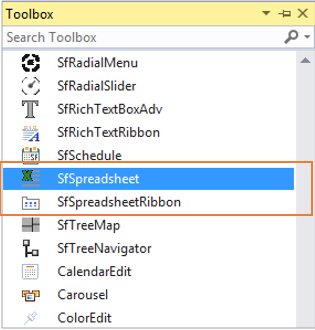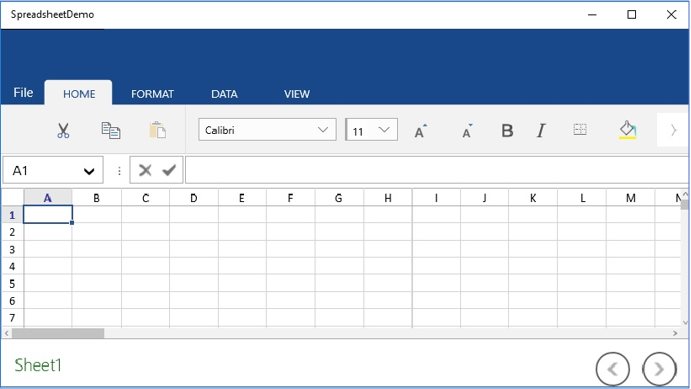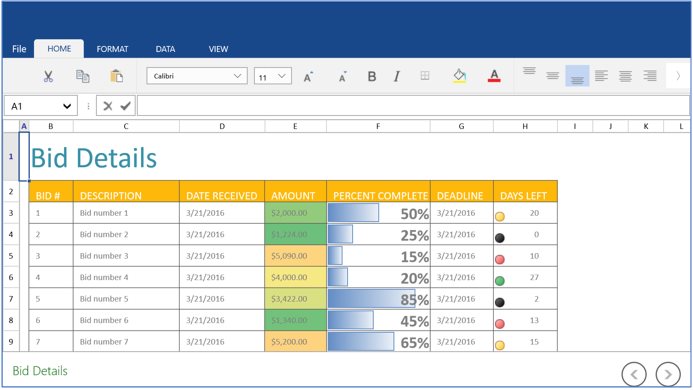How can I help you?
Getting Started with UWP Spreadsheet (SfSpreadsheet)
6 Aug 20256 minutes to read
This section helps you to get started with the SfSpreadsheet
Assemblies Deployment
Below table describes, list of assemblies required to be added in project when the SfSpreadsheet control is used in your application.
| Assembly | Description |
|---|---|
| Syncfusion.SfCellGrid.UWP.dll | Contains the base and fundamental classes which holds the underlying architecture for displaying cells with virtualized behavior and selection/interaction of cells. |
| Syncfusion.SfGridCommon.UWP.dll | Covers the classes which holds the properties of scroll viewer and disposable elements |
| Syncfusion.SfSpreadsheet.UWP.dll | Contains the classes that handles all the UI Operations of SfSpreadsheet such as importing of sheets, applying formulas/styles etc. |
| Syncfusion.SfShared.UWP.dll | Contains the classes which holds the properties and operations of the controls like SfUpDown, SfNavigator, Looping control etc |
| Syncfusion.SfInput.UWP.dll | Contains the classes which holds the controls like SfDropDownButton, SfTextBoxExt,SfMaskedEdit etc. |
| Syncfusion.SfRibbon.UWP.dll | Covers the classes which holds the Ribbon controls such as SfRibbon, SfRibbonMenu, SfRibbonGalleryItem etc. |
| Syncfusion.SfTabControl.UWP.dll | Covers the classes which holds the controls like SfTabControl, SfTabItem etc |
| Syncfusion.XlsIO.UWP.dll | Contains the base classes which is responsible for read and write in Excel files, Worksheet Manipulations, Formula calculations etc. |
Below are the assemblies list that can be added when you want to enable certain features in SfSpreadsheet control.
| Optional Assemblies | Description |
|---|---|
| Syncfusion.SfSpreadsheetHelper.UWP.dll | Contains the classes which is responsible for importing charts and sparklines into SfSpreadsheet |
| Syncfusion.ExcelChartToImageConverter.UWP.dll | Contains the classes which is responsible for converting charts as image |
| Syncfusion.SfChart.UWP.dll | Contains the classes which is responsible for importing charts like Line charts, Pie charts, Sparklines etc. |
Create a Simple Application with SfSpreadsheet
SfSpreadsheet control can be added into the application either via designer or via coding.
Adding a Control via Designer
1.Create new UWP application in Visual Studio.
2.Open the Visual Studio Tool box. Navigate to “Syncfusion® Controls” tab, and find the SfSpreadsheet/SfSpreadsheetRibbon toolbox items

3.Drag SfSpreadsheet and drop in to the Designer area from the Toolbox
For Spreadsheet:
<syncfusion:SfSpreadsheet x:Name="spreadsheet" />4.Ribbon can be added to the application by dragging and dropping SfSpreadsheetRibbon to the Designer area.
5.To make an interaction between Ribbon items and SfSpreadsheet, need to bind the SfSpreadsheet as DataContext to the SfSpreadsheetRibbon.
For Ribbon:
<syncfusion:SfSpreadsheetRibbon DataContext="{Binding ElementName=spreadsheet}" />Adding Control Via Coding
Spreadsheet is available in the following namespace “Syncfusion.UI.Xaml.Spreadsheet” and it can be created programmatically either by using XAML or C# code.
<Page
x:Class="SfSpreadsheetDemo.MainPage"
xmlns="http://schemas.microsoft.com/winfx/2006/xaml/presentation"
xmlns:x="http://schemas.microsoft.com/winfx/2006/xaml"
xmlns:local="using:SfSpreadsheetDemo"
xmlns:d="http://schemas.microsoft.com/expression/blend/2008"
xmlns:mc="http://schemas.openxmlformats.org/markup-compatibility/2006"
xmlns:tools="using:Syncfusion.UI.Xaml.Controls.Navigation"
xmlns:syncfusion="using:Syncfusion.UI.Xaml.Spreadsheet"
mc:Ignorable="d">
<syncfusion:SfSpreadsheet x:Name="spreadsheet" FormulaBarVisibility="Visible" />
</Page>SfSpreadsheet spreadsheet = new SfSpreadsheet();
this.grid.Children.Add(spreadsheet);You can get the following output when execute the application.

NOTE
To load the SfSpreadsheet in Windows Mobile, add the below code in MainPage.xaml file in DeviceFamily-Mobile folder.
<Page
x:Class="SfSpreadsheetDemo.MainPage"
xmlns="http://schemas.microsoft.com/winfx/2006/xaml/presentation"
xmlns:x="http://schemas.microsoft.com/winfx/2006/xaml"
xmlns:local="using:SfSpreadsheetDemo"
xmlns:d="http://schemas.microsoft.com/expression/blend/2008"
xmlns:mc="http://schemas.openxmlformats.org/markup-compatibility/2006"
xmlns:tools="using:Syncfusion.UI.Xaml.Controls.Navigation"
xmlns:syncfusion="using:Syncfusion.UI.Xaml.Spreadsheet"
mc:Ignorable="d">
<Grid Background="{ThemeResource ApplicationPageBackgroundThemeBrush}">
<Syncfusion:SfSpreadsheetRibbon DataContext="{Binding ElementName=spreadsheet}">
<Syncfusion:SfSpreadsheetRibbon.Content>
<Syncfusion:SfSpreadsheet x:Name="spreadsheet"/>
</Syncfusion:SfSpreadsheetRibbon.Content>
</Syncfusion:SfSpreadsheetRibbon>
</Grid>
</Page>Creating a new Excel Workbook
A new workbook can be created by using a Create method with specified number of worksheets. By default, a workbook will be created with single worksheet.
spreadsheet.Create(2);Opening an existing Excel Workbook
The Excel Workbook can be opened in SfSpreadsheet using the Open method in various ways,
//Using Stream,
spreadsheet.Open (Stream file)
//Using StorageFile,
spreadsheet.Open (StorageFile file)
//Using Workbook,
spreadsheet.Open(IWorkbook workbook)Stream fileStream = typeof(MainPage).GetTypeInfo().Assembly.GetManifestResourceStream("SfSpreadsheetDemo.Assets.BidDetails.xlsx");
this.spreadsheet.Open(fileStream);
Saving the Excel Workbook
The Excel workbook can be saved in SfSpreadsheet using Save method. If the workbook already exists in the system drive, it will be saved in the same location, otherwise Save Dialog box opens to save the workbook in user specified location.
spreadsheet.Save();You can also use SaveAs method directly to save the existing excel file with modifications.
The SaveAs method in SfSpreadsheet can be used in various ways,
//Using Storage File,
spreadsheet.SaveAs (StorageFile file);
//Using String,
spreadsheet.SaveAs (string file);
//For Dialog box,
spreadsheet.SaveAs();Displaying Charts and Sparklines
For importing charts and sparklines in SfSpreadsheet, add the following assembly as reference into the application.
Assembly: Syncfusion.SfSpreadsheetHelper.UWP.dll
Charts
Create an instance of Syncfusion.UI.Xaml.SpreadsheetHelper.GraphicChartCellRenderer and add that renderer into GraphicCellRenderers collection by using the helper method AddGraphicChartCellRenderer which is available under the namespace Syncfusion.UI.Xaml.Spreadsheet.GraphicCells.
public MainWindow()
{
InitializeComponent();
//For importing charts,
this.spreadsheet.AddGraphicChartCellRenderer(new GraphicChartCellRenderer());
}Sparklines
Create an instance of Syncfusion.UI.Xaml.SpreadsheetHelper.SparklineCellRenderer and add that renderer into the Spreadsheet by using the helper method AddSparklineCellRenderer which is available under the namespace Syncfusion.UI.Xaml.Spreadsheet.GraphicCells.
public MainWindow()
{
InitializeComponent();
//For importing sparklines,
this.spreadsheet.AddSparklineCellRenderer(new SparklineCellRenderer());
}